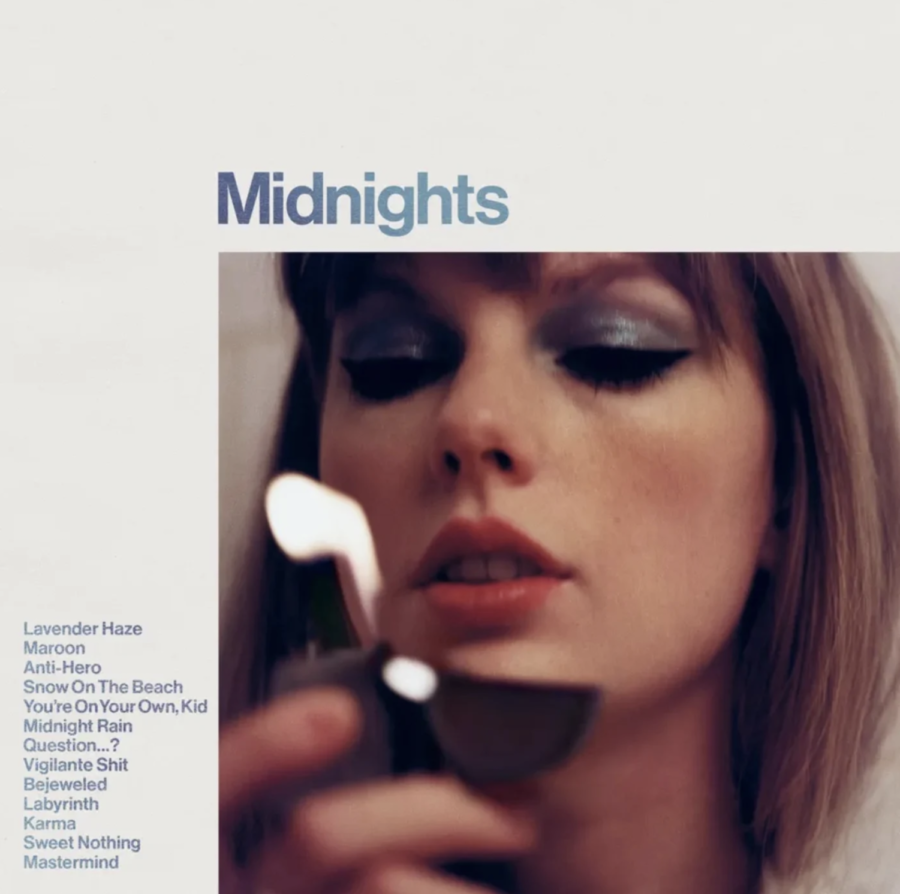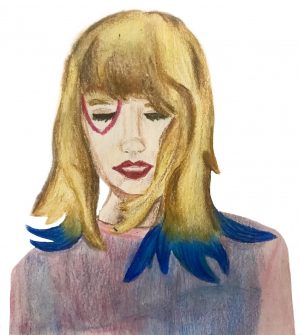Taylor Swift’s “Midnights” reflects the surreal honesty of her sleepless nights
November 1, 2022
Taylor Swift’s highly anticipated 10th studio album, “Midnights”, tells the story of “13 sleepless nights” through intimate, subdued pop. The album was shrouded in mystery during the weeks leading up to its release on Oct. 21, leaving fans guessing everything from the concept to the genre. Ultimately, “Midnights” feels like a culmination of Swift’s most notable pop albums: it has the glitz and shine of “1989,” the defiance of “Reputation” and the hazy, dreamy quality of “Lover.”
Lavender Haze
A slow-moving love song, “Lavender Haze” opens up the album by playing off the best tones of a Kelly Lee Owens, Jessie Ware and pre-2018 Perfume Genius club ballad. The dry, sliding drums cut through the steady 808 line to create a seductive, creeping sound as listeners dive into Swift’s newest album. The ethereal chorus paired with the bouncing in-and-out of backing vocals perfectly complements the lyrical content of the piece, defined by the hypnotic, trance-like seduction of a late-night love. While typical of most pop songs, the repetition in the chorus is fitting: the lyrics tiptoe with the pulsating bass vocals to mimic the sensational touch and weak-kneed vulnerability of love’s power. This song doesn’t use any revolutionary lyrical themes or powerful musical techniques but instead introduces an album that defines Swift as she is 10 albums and 14 years later: someone undeniable and perfected in and of herself.
Maroon
“Maroon” is a mellow interlude in the album, though it comes second in the track list. Swift creates a slower, more relaxed beat and wanders in a melancholy haze through the aftermath of a breakup. During the bridge, Swift drops her guard and her shaky vocal fry makes it clear that she’s devastated. It’s a subdued listening experience, and first-time listeners come into Swift’s genre at a diagonal. The track is nevertheless powerful, especially with the effective use of pauses. There is a poignant intimacy in her phrasing of “The one I was dancing with / No shoes”; the beauty of dancing blissfully, shoes cast aside, with someone you love, is clouded by the fact that “the one” is gone by now. The happy moments she references are no more.
Throughout the song, Swift grapples with the legacy her ex-boyfriend has left her. The answer lies in the imagery of “rust between telephones,” of sky and flushed cheeks and rubies he bought her. Whether it’s because thinking about him is too painful or what he’s left her is too precious, his only link between each moment — his only legacy — is the color maroon.
Anti-Hero
When Swift described “Anti-Hero” as one of the “favorite songs [she’s] ever written” before the album’s release, she set high expectations for the third track. The song portrays her “struggle with the idea of not feeling like a person” by revealing some deep insecurities (being an embarrassment, getting laughed out of dinner and being “the problem” at her own funeral) in the official music video. However, “Anti-Hero’s” vulnerability is somewhat disrupted by corny lyrics like “Sometimes I feel like everybody is a sexy baby / And I’m a monster on the hill.” While the lyric may be a reference to the show 30 Rock, it’s not a very tasteful one. The blunt image of being “a monster on the hill” distracts from the insecurities she’s conveying, disappointing fans who are used to more clever, subtle lyrics. Still, Swift’s genuine, raw descriptions of her fear of being perceived as the “anti-hero” manage to strike a chord with her audience, and “Anti-Hero” has quickly become one of the most popular songs on the album.
Snow On The Beach (ft. Lana Del Rey)
“Snow on the Beach” starts off with a Christmas-sounding jingle, as Swift begins to tell the tale of the end of her past relationship — it was like “snow on a beach”. The end was slow, but falling apart all around her. Throughout the track, the Christmas jingle continues in the background, perfectly apt for the wintery theme of the song. Her voice drops to a whisper as the song closes with more instrumental music. Leading up to the release of the album, fans were promised an exciting collaboration between renowned Lana Del Rey and Swift. However, as Del Rey fans excitedly await for her soft and gentle voice to stream through the song, it seems as though Del Rey plays a wistfully small role in the song.
You’re On Your Own, Kid
“You’re On Your Own, Kid” is a vulnerable reflection of the sacrifices Swift has made to chase after her dreams. The track’s base is composed of a heart-thumping beat that builds the pace for the track perfectly. The beginning is mainly powered by Swift’s vocals, which are noticeably more clear in this track. The topic of betrayal and loneliness are prominent with the lyrics, “I search the party of better bodies / Just to learn that you never cared,” which allude to Swift’s gut-wrenching 10-minute hit, “All Too Well.” Recalling the time her lover didn’t turn up to her 21st birthday party, “And he said, ‘It’s supposed to be fun turning twenty-one.’” Smothered with emotions, this track is easily a go-to for anyone who feels a little alone.
Midnight Rain
In “Midnight Rain,” Swift uses a melancholic vibe to convey her story of breaking up with a lover because she didn’t want to settle down. The song starts off with a voice singing, “He wanted it comfortable / I wanted that pain / He wanted a bride / I was making my own name.” Rather than being heartbroken as Swift portrays in her previous track, she was doing the heartbreaking. Swift describes how she decided to chase her dreams of being a singer, instead of being held back, hinted with the lyrics “My town was a wasteland / Full of cages, full of fences / Pageant queens and big pretenders / But for some it was paradise.” This song highlights how she had other priorities and it turned her life around.
Question…?
In “Question…?” Swift somberly reflects on a short-lived, long-lost romance. Possibly referencing her past relationship with Harry Styles, a calm beat is overlaid with lyrics marked by a melancholic, pensive tone and poignant rhetorical questions like “Did you wish you’d put up more of a fight?” and “Do you wish you could still touch her?” Dazed by the past, though she searches for the colorful memories of before, they’re nothing more than broken reminders. Swift has already resigned and accepts the immutability of the past; after all, she knows that it’s just a question about a distant love from before. It’s just a question.
Bejeweled
From the very beginning,“Bejeweled” aims to break gender stereotypes and empower women. Its music video, written and directed by Swift herself, takes place in a Cinderella-esque world, except, this time, Taylor ghosts the prince and keeps the castle. Similar to the confident concept of “Look What You Made Me Do,” the song’s hazy but upbeat tune makes it enjoyable to listen to. Swift’s distinct and well known talent to tell stories through her music once again shines in “Bejeweled” with a dazzling music video and lyrics.
Karma
“Karma” is by far the most up-beat track in the album. Swift delivers her confident and edgy tone, similar to “I Forgot That You Existed” from the 2019 album “Lover.” In this track Swift is letting everyone know that karma will provide them with just consequences for their actions. “Karma’s a relaxing thought / Aren’t you envious that for you it’s not?” With the occasional playful lyric or two (some being questionable due to their strange nature, “Karma is a cat purring in my lap ’cause it loves me,”) this track is the most peppy out of the entirety of the album.
Sweet Nothing
In “Sweet Nothing,” Swift delivers a sweet romantic song reminiscent of tracks about young love in a previous album, “Folklore” like “seven” and “invisible string.” “Sweet Nothing” describes “running home” to the comfort of old, familiar relationships instead of venturing out to see what you’re missing. Instead of playing into the sense of dissatisfaction that can grow from those uncomfortably close relationships, Swift describes how quiet, ordinary relationships can be the most fulfilling. To anyone else, having a relationship that’s just “sweet nothing” may seem unappealing, yet Swift describes it in joy, with lyrics like “you’re in the kitchen humming” depicting the quiet comfort that she seems to crave in the sleepless hours around midnight.
Mastermind
In “Mastermind,” Swift uses a pulsing beat to paint herself as a cunning, Machiavellian schemer. The song initially sounds like the retelling of a love story, but as always, there’s more to her lyrics than what meets the eye. The song is almost self-congratulatory and proud. It acknowledges her nature as the master strategist that she’s always been viewed as by the general public (“I laid the groundwork, and then / Just like clockwork / The dominoes cascaded in a line”). Sonically, “Mastermind” is in the same vein as the rest of the album. However, it certainly brings closure to the introspection of “Midnights,” ending on a high note as she sings about someone who sees right through her and loves her still: “You knew the entire time / You knew that I’m a mastermind / And now you’re mine.”
Of course, it wouldn’t be a Taylor Swift release without an unexpected (yet delightful) surprise. Her “Midnights (3am Edition)” dropped at 3 a.m. ET, featuring seven extra songs that “[she] wrote on [her] journey to find the magic 13” of the original.
Bigger than the Whole Sky
The second track on the deluxe version of “Midnights,” “Bigger than the whole sky” offers comfort through its melancholy. Swift’s breathy vocals add to the experience of the song, and the soft backing instrumentals makes it seem like a lullaby. She describes the pain of losing someone who was “bigger than the whole sky” and it resonates with anyone who has experienced loss; the song brings tears to the eyes;The “goodbye, goodbye, goodbye” sounds hauntingly beautiful .It almost seems like Swift’s voice cuts through the blanket of comfort that the instrumentals give. The song is a sister song to “Ronan,” from her “Red” album, and it displays her excellent song-writing skills.
High Infidelity
In “High Infidelity,” Swift delves into the topic of cheating and falling out of love. Though not married herself, she tells a story through a bride whose husband abandons her, which leads her to find a man who truly cares about her. She portrays this in the lyrics, “You know there’s many different ways that you can kill the one you love/ The slowest way is never loving them enough/ Do you really want to know where I was April 29th?/ Do I really have to tell you how he brought me back to life.” Swift expresses how the protagonist didn’t realize what she was getting herself into with the marriage, but afterwards, she realizes and decides to move on and find someone who is deserving of her.
Would’ve, Could’ve, Should’ve
Though she returns to her quintessential pop sound in “Midnights,” Swift hasn’t completely left her country-music roots behind. “Would’ve, Could’ve, Should’ve” sounds upbeat, a kind of throwback to her albums “Fearless” and “Speak Now” (released in 2008 and 2010 respectively). But lyric-wise it’s gritty, with Swift mourning her girlhood as she reminisces of a past romance — likely her 2009 relationship with John Mayer, when she was 19 and he was 32. She addressed Mayer once before on “Dear John,” a track on “Speak Now,” singing, “Don’t you think nineteen is too young?” Now, she revisits the past through a more mature lens, using religious imagery to pour out her regrets and confronting the ghosts from her past. “God rest my soul / I miss who I used to be / The tomb won’t close / Stained glass windows in my mind,” she sings of the exploitative age gap with heart-wrenching honesty and bravery.
Conclusion
“Midnights” isn’t Taylor Swift’s most diverse-sounding album by any means, and most tracks land on the more mellow end of her musical spectrum. But the quiet, atmospheric style helps shine a spotlight on Swift’s remarkable lyricism – lines upon lines that fill the album with every emotion from bliss to melancholy to outrage. “Midnights” exists in the confines of her bedroom, between the hours of 12 a.m. and one, settling into the liminal space that is occupied by nothing else but late-night yearning and regret. It might not be considered revolutionary, but “Midnights” hits its mark as Swift’s sweeping declaration of her confidence in intimacy.













